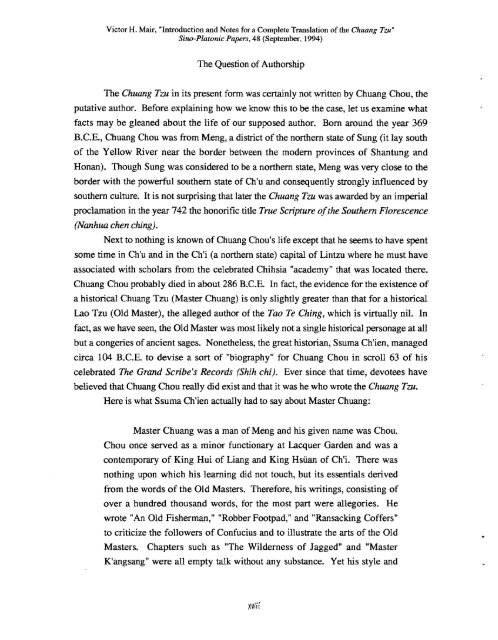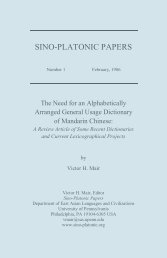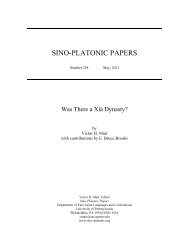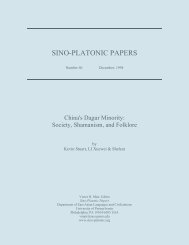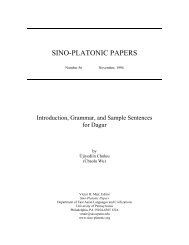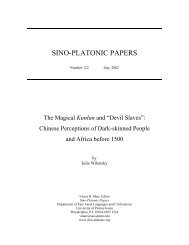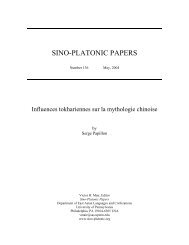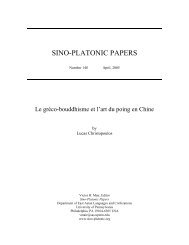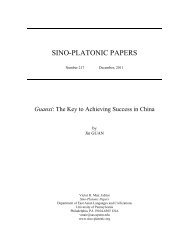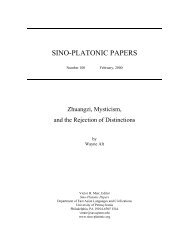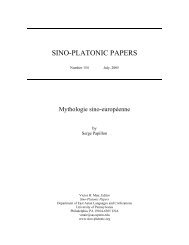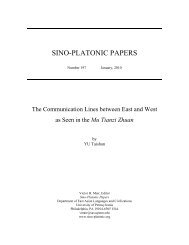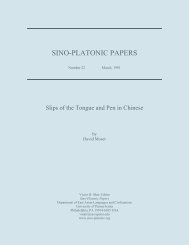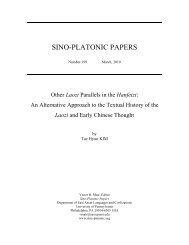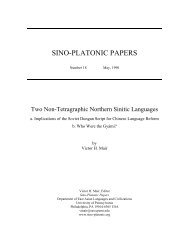Introduction and Notes for a Complete Translation of the Chuang Tzu
Introduction and Notes for a Complete Translation of the Chuang Tzu
Introduction and Notes for a Complete Translation of the Chuang Tzu
You also want an ePaper? Increase the reach of your titles
YUMPU automatically turns print PDFs into web optimized ePapers that Google loves.
Victor H. Mair, "<strong>Introduction</strong> <strong>and</strong> <strong>Notes</strong> <strong>for</strong> a Conlplete <strong>Translation</strong> <strong>of</strong> <strong>the</strong> <strong>Chuang</strong> <strong>Tzu</strong>"<br />
Sirw-Platorric Papers, 48 (September, 1994)<br />
The Question <strong>of</strong> Authorship<br />
The <strong>Chuang</strong> Tw in its present <strong>for</strong>m was certainly not written by <strong>Chuang</strong> Chou, <strong>the</strong><br />
putative author. Be<strong>for</strong>e explaining how we know this to be <strong>the</strong> case, let us examine what<br />
facts may be gleaned about <strong>the</strong> life <strong>of</strong> our supposed author. Born around <strong>the</strong> year 369<br />
B.C.E., <strong>Chuang</strong> Chou was from Meng, a district <strong>of</strong> <strong>the</strong> nor<strong>the</strong>rn state <strong>of</strong> Sung (it lay south<br />
<strong>of</strong> <strong>the</strong> Yellow River near <strong>the</strong> border between <strong>the</strong> modem provinces <strong>of</strong> Shantung <strong>and</strong><br />
Honan). Though Sung was considered to be a nor<strong>the</strong>rn state, Meng was very close to <strong>the</strong><br />
border with <strong>the</strong> powerful sou<strong>the</strong>rn state <strong>of</strong> Ch'u <strong>and</strong> consequently strongly influenced by<br />
sou<strong>the</strong>rn culture. It is not surprising that later <strong>the</strong> <strong>Chuang</strong> Toc was awarded by an imperial<br />
proclamation in <strong>the</strong> year 742 <strong>the</strong> honorific title True Scripture <strong>of</strong> <strong>the</strong> Sou<strong>the</strong>rn Florescence<br />
(Nanhuo chen ching).<br />
Next to nothing is lcnown <strong>of</strong> <strong>Chuang</strong> Chou's life except that he seems to have spent<br />
some time in Ch'u <strong>and</strong> in <strong>the</strong> Ch'i (a nor<strong>the</strong>rn state) capital <strong>of</strong> Lintzu where he must have<br />
associated with scholars from <strong>the</strong> celebrated Chihsia "academy" that was located <strong>the</strong>re.<br />
<strong>Chuang</strong> Chou probably died in about 286 B.C.E. In fact, <strong>the</strong> evidence <strong>for</strong> <strong>the</strong> existence <strong>of</strong><br />
a historical <strong>Chuang</strong> <strong>Tzu</strong> (Master <strong>Chuang</strong>) is only slightly greater than that <strong>for</strong> a historical<br />
Lao <strong>Tzu</strong> (Old Master), <strong>the</strong> alleged author <strong>of</strong> <strong>the</strong> Too Te Ching, which is virtually nil. In<br />
fact, as we have seen, <strong>the</strong> Old Master was most likely not a single historical personage at all<br />
but a congeries <strong>of</strong> ancient sages. None<strong>the</strong>less, <strong>the</strong> great historian, Ssuma Ch'ien, managed<br />
circa 104 B.C.E. to devise a sort <strong>of</strong> "biography" <strong>for</strong> <strong>Chuang</strong> Chou in scroll 63 <strong>of</strong> his<br />
celebrated The Gr<strong>and</strong> Scribe's Records (Shih chi). Ever since that time, devotees have<br />
believed that <strong>Chuang</strong> Chou really did exist <strong>and</strong> that it was he who wrote <strong>the</strong> <strong>Chuang</strong> T'.<br />
Here is what Ssurna Ch'ien actually had to say about Master <strong>Chuang</strong>:<br />
Master <strong>Chuang</strong> was a man <strong>of</strong> Meng <strong>and</strong> his given name was Chou.<br />
Chou once served as a minor functionary at Lacquer Garden <strong>and</strong> was a<br />
contemporary <strong>of</strong> King Hui <strong>of</strong> Liang <strong>and</strong> King Hsiian <strong>of</strong> Ch'i. There was<br />
nothing upon which his learning did not touch, but its essentials derived<br />
from <strong>the</strong> words <strong>of</strong> <strong>the</strong> Old Masters. There<strong>for</strong>e, his writings, consisting <strong>of</strong><br />
over a hundred thous<strong>and</strong> words, <strong>for</strong> <strong>the</strong> most part were allegories. He<br />
wrote "An Old Fisherman,'' "Robber Footpad," <strong>and</strong> "Ransacking C<strong>of</strong>fers"<br />
to criticize <strong>the</strong> followers <strong>of</strong> Confucius <strong>and</strong> to illustrate <strong>the</strong> arts <strong>of</strong> <strong>the</strong> Old<br />
Masters. Chapters such as "The Wilderness <strong>of</strong> Jagged" <strong>and</strong> "Master<br />
K'angsang" were all empty talk without any substance. Yet his style <strong>and</strong>


